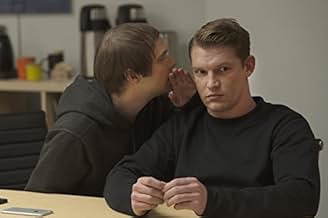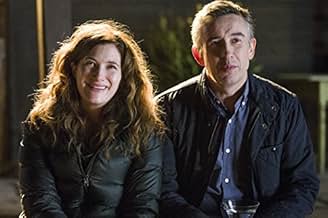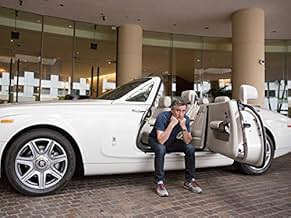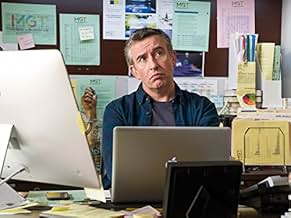IMDb RATING
7.2/10
3.3K
YOUR RATING
On his birthday, Thom Payne receives the gift of insignificance and also a new boss. He suspects his erectile dysfunction pills are interfering with his antidepressants, leaving him hapless.On his birthday, Thom Payne receives the gift of insignificance and also a new boss. He suspects his erectile dysfunction pills are interfering with his antidepressants, leaving him hapless.On his birthday, Thom Payne receives the gift of insignificance and also a new boss. He suspects his erectile dysfunction pills are interfering with his antidepressants, leaving him hapless.
Browse episodes
Storyline
Did you know
- TriviaThe project had originally been planned as a starring vehicle for Philip Seymour Hoffman, but was put on hold after the actor's death until the role could be recast, with Steve Coogan now in the lead role.
- ConnectionsFeatured in The Wright Stuff: Episode #21.60 (2016)
Featured review
I'm not sure how this series would be perceived by young people, or by seniors, but as a middle-aged person, I feel like the topics covered in this series are dead-on.
Ignore the characters for a moment. If you focus just on them, you might see this series as a story of entitled people who have all they need (and more) but still feel unhappy. To me that's not the message at all. Through these characters the viewer is exploring a rather serious topic in our modern society. What makes us happy? Or perhaps more accurately, why are so many people unhappy? Anti-depressants are the most profitable pharmaceutical drug of this century. They don't really cure anything yet so many people are, or have been on them. Why? Are we all just a bunch of malcontents or is something really wrong here?
Statistics have shown that people in their 40's are the least happy demographic but that they find themselves again in their 50's. What changes in those few years? I believe it's that we go through a second rebellion. If we are smart, we concentrate on life, living, being with those we care about and caring less about how we look, and what other people think. Downscaling, shedding responsibilities, finding more time for leisurely pursuits and spending less time working or chasing a fleeting goal - these things are important.
We've all been sold a bill of good by our parents, schools, media and advertisers. Go to school, then college, fall in love, get married, buy a house, eat this, buy that, achieve success - and so on. Increasingly, people feel like this model of happiness doesn't fit for them.
Look around, people are quietly ditching our commercial culture for one that fits their real needs.
Despite persistent messages that consumption and conformity are the paths to happiness, many of us are increasingly learning that following our own path is what we really should be doing.
Great series. Very inspiring - but watch it with the attitude that much of what is depicted is metaphorical. It leaves the viewer to ponder what it is that they gave up to be just another cog in the machine.
And a side-note to the guy who said; "worst liberal self hating selfish ,me,me,me,me bull crap." This is not a story of liberals or conservatives. You have missed the point entirely. Depression and self-doubt do not favour any particular political persuasion. I suggest you re-watch without the political bias. Interpret Happyish in black and white and you'll miss the shades of grey in this, and in real life.
Ignore the characters for a moment. If you focus just on them, you might see this series as a story of entitled people who have all they need (and more) but still feel unhappy. To me that's not the message at all. Through these characters the viewer is exploring a rather serious topic in our modern society. What makes us happy? Or perhaps more accurately, why are so many people unhappy? Anti-depressants are the most profitable pharmaceutical drug of this century. They don't really cure anything yet so many people are, or have been on them. Why? Are we all just a bunch of malcontents or is something really wrong here?
Statistics have shown that people in their 40's are the least happy demographic but that they find themselves again in their 50's. What changes in those few years? I believe it's that we go through a second rebellion. If we are smart, we concentrate on life, living, being with those we care about and caring less about how we look, and what other people think. Downscaling, shedding responsibilities, finding more time for leisurely pursuits and spending less time working or chasing a fleeting goal - these things are important.
We've all been sold a bill of good by our parents, schools, media and advertisers. Go to school, then college, fall in love, get married, buy a house, eat this, buy that, achieve success - and so on. Increasingly, people feel like this model of happiness doesn't fit for them.
Look around, people are quietly ditching our commercial culture for one that fits their real needs.
Despite persistent messages that consumption and conformity are the paths to happiness, many of us are increasingly learning that following our own path is what we really should be doing.
Great series. Very inspiring - but watch it with the attitude that much of what is depicted is metaphorical. It leaves the viewer to ponder what it is that they gave up to be just another cog in the machine.
And a side-note to the guy who said; "worst liberal self hating selfish ,me,me,me,me bull crap." This is not a story of liberals or conservatives. You have missed the point entirely. Depression and self-doubt do not favour any particular political persuasion. I suggest you re-watch without the political bias. Interpret Happyish in black and white and you'll miss the shades of grey in this, and in real life.
- dwatters-1
- Jul 19, 2015
- Permalink
Details
- Release date
- Country of origin
- Official site
- Language
- Also known as
- Happyish
- Production company
- See more company credits at IMDbPro
Contribute to this page
Suggest an edit or add missing content







































